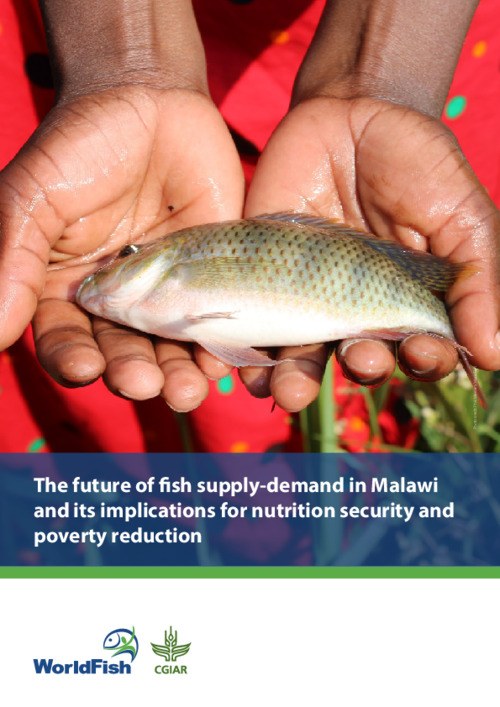Please use this identifier to cite or link to this item:
https://hdl.handle.net/20.500.12348/5358
The future of fish supply-demand in Malawi and its implications for nutrition security and poverty reduction
| dc.creator | Tran, N. | en_US |
| dc.creator | Peart, J. | en_US |
| dc.creator | Rodriguez, U.P. | en_US |
| dc.creator | Chan, C. | en_US |
| dc.creator | Hoong, Y. | en_US |
| dc.creator | Siamudaala, V. | en_US |
| dc.creator | Njaya, F. | en_US |
| dc.creator | Kafakoma, R. | en_US |
| dc.date.accessioned | 2023-01-10T09:11:11Z | |
| dc.date.available | 2023-01-10T09:11:11Z | |
| dc.date.issued | 2022 | en_US |
| dc.identifier.citation | Tran N, Peart J, Rodriguez UE, Chan CY, Hoong Y, Siamudaala V, Njaya F and Kafakoma R. 2022. The future of fish supply-demand in Malawi and its implications for nutrition security and poverty reduction. Penang, Malaysia: WorldFish. Working Paper: 2022-21. | en_US |
| dc.identifier.uri | https://hdl.handle.net/20.500.12348/5358 | |
| dc.description.abstract | Fish plays an important dietary and economic role in Malawi, providing 28% of animal protein intake. Per capita fish consumption increased from 10.7 kg in 2016 to about 12.6 kg in 2018. The contribution of fish to Malawi’s gross domestic product (GDP) is about 4%. In 2020, aquaculture supplied around 9400 t against almost 171,100 t from capture fisheries (FAO 2022). In response to the increase in domestic fish demand, Malawi imported more than 5000 t of fish in 2019 (FAO 2020a). Despite the high potential of capture fisheries and high level of aquaculture development and training, Malawi still lags behind other countries, such as Egypt, where 80% of fish production comes from aquaculture (FAO 2022). Malawi’s aquaculture production remains relatively low, accounting only for 5.2% of total national fish production (FAO 2022). Understanding the dynamics of fish production, consumption, trade, prices and their implications on food and nutrition security in Malawi is critical to supporting national policy and decision-making to ensure the growth of sustained fish production while minimizing unexpected socioeconomic and environmental impacts. The objective of this study was to provide a future outlook of the fish sector in Malawi by projecting the dynamics of fish supply and demand and drawing policy implications that can be of interest to policymakers in the country. | en_US |
| dc.format | en_US | |
| dc.language | en | en_US |
| dc.publisher | WorldFish (WF) | en_US |
| dc.rights | CC-BY-NC-4.0 | en_US |
| dc.subject | no poverty | en_US |
| dc.subject | zero hunger | en_US |
| dc.subject | climate action | en_US |
| dc.subject | life below water | en_US |
| dc.subject | climate adaptation and mitigation | en_US |
| dc.subject | fish demand | en_US |
| dc.subject | fish supply | en_US |
| dc.subject | nutrition, health and food security | en_US |
| dc.subject | poverty reduction, livelihoods and jobs | en_US |
| dc.title | The future of fish supply-demand in Malawi and its implications for nutrition security and poverty reduction | en_US |
| dc.type | Working Paper | en_US |
| cg.contributor.funder | African Development Bank | en_US |
| cg.contributor.funder | CGIAR Research Program on Policies, Institutions, and Markets | en_US |
| cg.contributor.funder | German Federal Ministry for Economic Cooperation and Development | en_US |
| cg.coverage.country | Malawi | en_US |
| cg.coverage.region | Eastern Africa | en_US |
| cg.subject.agrovoc | nutrition | en_US |
| cg.subject.agrovoc | gender equality | en_US |
| cg.subject.agrovoc | Fish | en_US |
| cg.contributor.affiliation | WorldFish | en_US |
| cg.contributor.affiliation | University of the Philippines Los Baños | en_US |
| cg.contributor.affiliation | Ministry of Agriculture Irrigation and Water Development, Department of Fisheries | en_US |
| cg.identifier.status | Open access | en_US |
| cg.contribution.worldfishauthor | Tran, N. | en_US |
| cg.contribution.worldfishauthor | Peart, J. | en_US |
| cg.contribution.worldfishauthor | Chan, C. | en_US |
| cg.contribution.worldfishauthor | Hoong, Y. | en_US |
| cg.contribution.worldfishauthor | Siamudaala, V. | en_US |
| cg.description.theme | Value chains and nutrition | en_US |
| cg.creator.id | Nhuong Tran: 0000-0002-1813-4571 | en_US |
| cg.creator.id | Chin Yee Chan: 0000-0001-8615-2678 | en_US |
